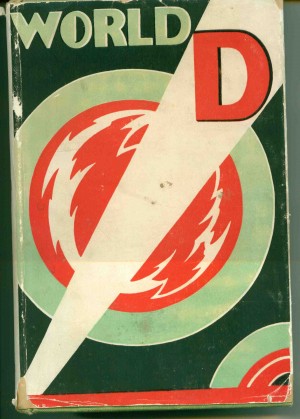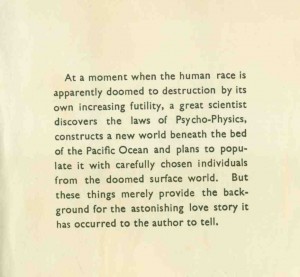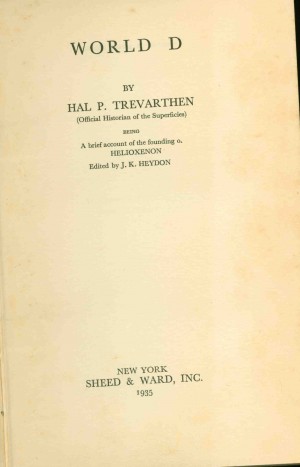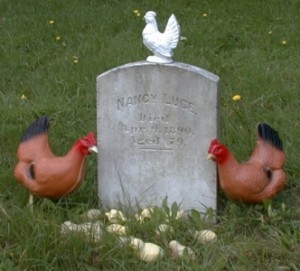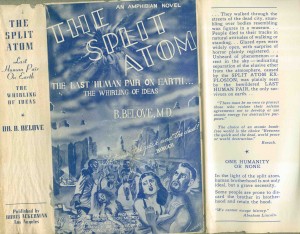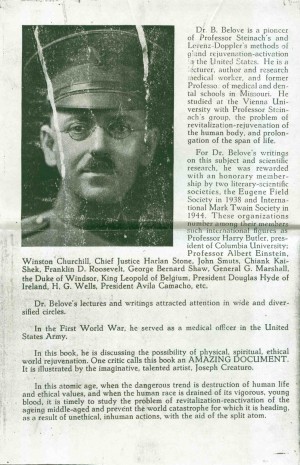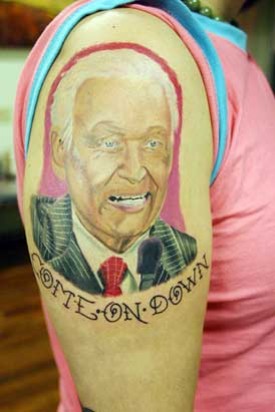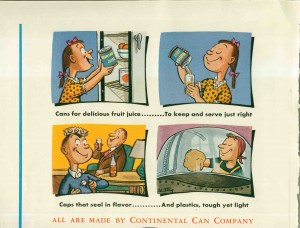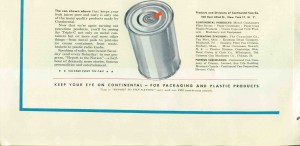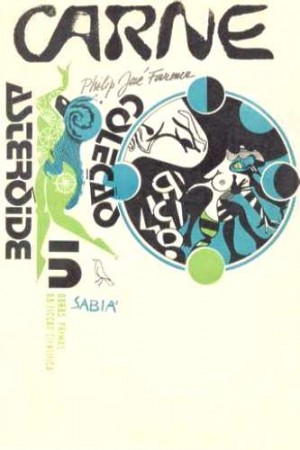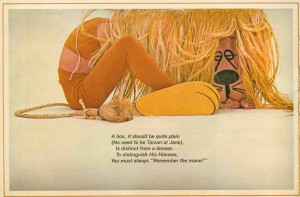Books
Contortionists
I started thinking about contortionists again when I happened upon a feature on them in an old issue of Life. In my novel Spondulix I had a character who was an "enter-ologist," a great term I found in Ricky Jay's wonderful history of sideshows and freaks, Learned Pigs and Fireproof Women. Enter-ologists get into impossible places, rather than escape from impossible places.In any case, a short search of the web turned up lots of online contortionist info, including the Contortion Home Page, which is where I found this pic of April Tatro. That's her in the video below as well.
Posted By: Paul - Fri Sep 12, 2008 -
Comments (7)
Category: Body Modifications, Entertainment, Human Marvels, Literature, Books, Science Fiction, Performance Art
World D
Here's another strange book I purchased but have not yet read. The real author is Joseph K. Heydon, using the pen-name of Hal Trevarthen. Time has swallowed up all details related to Heydon and his book, leaving us only with the text itself.Here's the description from the amazingly ugly dustjacket.
Here's the title page, followed by a sample of the actual bafflegab inside.
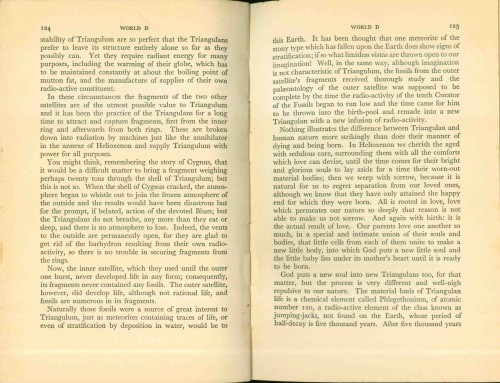 Posted By: Paul - Thu Sep 11, 2008 -
Comments (11)
Posted By: Paul - Thu Sep 11, 2008 -
Comments (11) Category: Aliens, Eccentrics, Government, Inventions, Literature, Books, Science Fiction, Writers, Nature, New Age, Paranormal, Pop Culture, Science, Psychology, Self-help Schemes, Foreign Customs, 1930s, Yesterday’s Tomorrows
Nancy Luce, Chicken Lady of Martha’s Vineyard
A few years ago, visiting the island of Martha's Vineyard off the Massachusetts coast, I learned of Nancy Luce (1814-1890). An eccentric loner artist who self-published her own poetry--mainly devoted to her beloved pet chickens--and buried the birds with fully engraved headstones, she is the subject of a biography still available on the island at various gift shops: Consider Poor I by Walter Magnes Teller. You can read what The New York Times had to say about the book here. You might even be so moved as to purchase a lovely woodcut print of Luce here.POOR LITTLE HEARTS
Poor little Ada Queetie has departed this life,
Never to be here no more,
No more to love, no more to speak,
No more to be my friend.
O how I long to see her with me alive and well,
Her heart and mine was united,
Love and feelings deeply rooted for each other,
She and I could never part,
I am left broken hearted....
Posted By: Paul - Wed Sep 10, 2008 -
Comments (10)
Category: Animals, Domestic, Eccentrics, Literature, Books, Writers, Regionalism, Nineteenth Century
The South Will Collect Its Pensions Again!
Posted By: Paul - Mon Aug 25, 2008 -
Comments (3)
Category: Animals, Death, Obituaries, History, Historical Figure, Hollywood, Literature, Books, Regionalism, War, Cartoons, Marriage
The Split Atom
Collecting weird books is one of my hobbies. And I'm not alone, as you can see from this site.Surely the novel depicted here, which I purchased a month ago at an SF convention, is museum-worthy. Amazingly in this day and age, I can't find any info about it or its author online. Thankfully, the previous owner xeroxed a page about the author and left it inside the book for me to reproduce here.
I can hardly wait to sit down with this one!
Posted By: Paul - Fri Aug 22, 2008 -
Comments (9)
Category: Eccentrics, Futurism, Literature, Books, Science Fiction, War, Weapons, 1940s
The Weirdest Tattoos
This is surely a book that will appeal to the WU crowd. A compilation of the worst tats ever inked. If this sample is representative, we're in for a treat.
Posted By: Paul - Wed Aug 20, 2008 -
Comments (16)
Category: Body Modifications, Tattoos, Stupidity, Books
Follies of the Mad Men #13
[From Fortune for December 1945. Two scans, top and bottom.]
There is nothing spectacularly "weird" about this particular entry in our series, except that the artist is William Steig, the famed illustrator and author responsible, most notably in Hollywood terms, for Shrek. It's curious to see him turning his talents to advertising during his early career, as so many artists who later grew rich and famous once did.
Perhaps the true vestige of weirdness here, though, is the image of the proud boy wearing his Jughead cap. You can learn about the history of the Jughead beanie and how to make such a cap yourself at Juggie's Wikipedia page. Or perhaps you'd want to buy one readymade, either here or here.
But maybe you want to go for the entire Jughead look!
Posted By: Paul - Sun Aug 17, 2008 -
Comments (2)
Category: Business, Advertising, Products, Fashion, Hollywood, Literature, Books, Fantasy, Movies, Comics, 1940s
13 Things That Don’t Make Sense
Posted By: Paul - Sun Aug 10, 2008 -
Comments (3)
Category: Science, Technology, Unsolved Mysteries, Books
Eugênio Hirsch
Discovering traces of a forgotten surrealist/pop artist is always nice and weird. That's why I'm happy to present here some data on Eugênio Hirsch--a name I believe will be little-known to English-speaking art-lovers.I took the liberty of having Google translate his Spanish Wikipedia entry, and then cleaned up the text a bit.
Eugênio Hirsch (Vienna, 1923 - Rio de Janeiro, September 23 2001) was a visual artist of Austrian origin, considered one of the pioneers of Brazilian graphic design.
Eugênio Hirsch was born in Vienna, Austria in 1923. Given the imminence of World War II his family emigrated in 1938 to Argentina, where Hirsch was highlighted as a graphic artist. During his stay in Argentina, he lived in Buenos Aires where he worked for the Encyclopedia Codex. In 1947 he met Monteiro Lobato, who illustrated texts mentioned in the editorial. He also lived in San Miguel de Tucuman where he worked with Lino Spilimbergo Enea.
In 1955 he emigrated to Brazil. Beginning in 1960 he was hired by the publisher "Civilização Brasileira" and in a short time revolutionized the concept and design of book covers, becoming one of the biggest names in this specialty. In 1960 he won the Jabuti Award (highest distinction in the field Brazilian literary and artistic). He was considered a pioneer of graphic design with decisive influence on subsequent generations. One of his favorite quote was "Uma feita layer is to attack, did not to please" ( "A cap is used to attack, not to please"). In 1965 he traveled to the United States where he collaborated with Playboy magazine and then to Europe, but then returned to his adoptive country, Brazil.
Among his most famous works include the illustration done for the novel Lolita by Vladimir Nabokov. He was also recalled for his eccentric personality.
Eugênio Hirsch died in Rio de Janeiro on September 23, 2001.
You can see some of his book covers on this Flickr page. But my favorite is this one he did for the novel Flesh by the great Philip Jose Farmer.
How did I chance upon Hirsch's work? Through this pictorial in Playboy for December 1965. The mildly NSFW totality of the feature is to be found after the jump.
More in extended >>
Posted By: Paul - Sun Aug 10, 2008 -
Comments (4)
Category: Art, Pop Art, Surrealism, History, Historical Figure, Literature, Books, Science Fiction, Magazines, Sexuality, Sex Symbols, World, Europe, South America
Invest in Literature—and a Piece of the Brooklyn Bridge
Do you have a spare $2000.00 lying around the house? Why not send it to this untested fiction writer and receive a share of his entirely hypothetical profits?In fact, I'm a relatively penniless writer too!
Thanks to good pal Sandy Pearlman for discovering this one!
Posted By: Paul - Fri Aug 08, 2008 -
Comments (4)
Category: Frauds, Cons and Scams, Literature, Books, Writers, Money, Charity, Self-help Schemes, Performance Art

| Who We Are |
|---|
| Alex Boese Alex is the creator and curator of the Museum of Hoaxes. He's also the author of various weird, non-fiction, science-themed books such as Elephants on Acid and Psychedelic Apes. Paul Di Filippo Paul has been paid to put weird ideas into fictional form for over thirty years, in his career as a noted science fiction writer. He has recently begun blogging on many curious topics with three fellow writers at The Inferior 4+1. Contact Us |


